Why it matters for European security if an American no longer commands Nato troops – by a former Trident submarine commander.
Gen Christopher Cavoli is due to come to the end of his term as Supreme Allied Commander Europe (Saceur) this summer. Since 1951, this post has been filled by American four-star officers, admirals or generals.
This article is the opinion of the author, Andrew Corbett, King’s College London, and not necessarily that of the UK Defence Journal. If you would like to submit your own article on this topic or any other, please see our submission guidelines.
But Cavoli might be the last American in the role, at least for a while. The Trump administration is considering relinquishing this important post as part of a cost-saving US Armed Forces command restructuring exercise and, potentially, as a step back from its leading role in European security since the 1950s.
In parallel, the UK and German defence ministers have taken over chairing this week’s Ukraine Defence Contact Group, a gathering of defence ministers from 30 countries, which has previously been chaired by the US defense secretary.
Cavoli said, during a hearing in the Senate this month, that it would be problematic if the US steps back from its leadership role in Nato. Previous heads of the Nato command have agreed. They’re not wrong. Removing the American Saceur position is not an internal matter like replacing senior officers serving in US posts who do not fit a particular political profile. It would have profound effects on Nato’s military capability and immediately significant and tangible repercussions for alliance deterrence strategy.
An enemy’s perception of the military capability of Nato forces is a fundamental element of its deterrence strategy. Replacing a US Supreme Commander with a European would inject significant uncertainty into perceptions of US commitment to Nato and could critically undermine that perception of coherent military strength. It would be made to work, but Nato’s deterrence posture would be less convincing, and this is especially important given European concerns about Russian aggression in the region.
It is not clear yet how the Trump administration’s view of Nato will evolve. Public statements advocating support for Nato contradict private views expressed by his cabinet in the notorious Signal-gate chat. Previous US president, Joe Biden, viewed allies as an unrivalled strength. Trump seems to care little about the impact of his decisions on his allies.
Deleting the US Saceur post would emphasise that interpretation and weaken Nato deterrence at a critical moment in its relations with Russia.
What’s the history?
Trump is not the first US president to make a foreign policy shift away from Europe. President Barack Obama announced a pivot to Asia in November 2011. This focus on China as a “pacing threat” offering major challenges to the US has persisted.
It manifests itself under Trump as a transactional demand on European allies to contribute more to Nato so the US can release resources to focus on the Pacific, potentially redeploying personnel and capabilities there. Trump has never concealed his disdain for Nato, often wondering what its benefit for the US was. Much of this rhetoric may be for his domestic audience, but it negatively affects international perceptions of Nato’s power.
The idea of a European Saceur has also been proposed before, including by former US secretary of state Henry Kissinger in 1984. That proposal was made at a low point of the cold war and Kissinger’s rationale was political. European military leadership would force European political leaders to acknowledge their responsibilities for Nato nuclear policy.
Political control of military force is, of course, important for any democratic state. Saceur reports to the North Atlantic Council (the NAC, Nato’s highest body) which comprises ambassadors from every member country. Its chair, the secretary-general, is always a European (or Canadian), and the deputy secretary-general is always an American.
The highest level of military command authority, the ability to organise and employ commands and forces to accomplish assigned missions, is known in the US as Combatant Command (COCOM). Most Nato states retain the COCOM equivalent but delegate the next lower level of command; Operational Command (OPCOM) to Nato commanders.
Issues at stake
US domestic law requires COCOM to be exercised over US forces – but only by US officers. This authority cannot be delegated. An American Supreme Commander Europe exercises operational command over all forces assigned to Nato, but a European leader in the same role could exercise only a much more restrictive level of authority over assigned US forces.
There is dispensation for an exception to this to meet an attack on Nato, but not for training exercises. Unity of command is challenging enough in multi-national operations, even after 75 years of training, so this is a major obstacle.
Another issue is that the authority to release all US nuclear weapons is retained by the US president. Accordingly, every key post in the Nato nuclear operations chain is held by a US official. A Nato request for a nuclear strike is made to the US president through Saceur. It is not clear how this would work if Saceur were no longer American. This is one of the major potential obstacles ahead of any decision to move the command to a European.
And here’s another. In a crisis, Nato would plan to deploy 30 army divisions (of 15,000 personnel each), 30 squadrons of fighter aircraft and 30 combat warships from across the alliance within 30 days. Any Supreme Commander Europe would have to command international forces numbering hundreds of thousands of personnel. There are very few (if any) European officers who could credibly claim to be suitably experienced to replace Cavoli. No British officer has commanded even one deployed division since the 2003 invasion of Iraq.
But by the summer if Cavoli is replaced by a European, Nato needs to have most of these thorny issues resolved, or at least come up with plans on how to do so, or create significant risks for European security. For now, this is not looking simple at all.![]()
Andrew Corbett, Senior Lecturer in Defence Studies, King’s College London. This article is republished from The Conversation under a Creative Commons license. Read the original article.


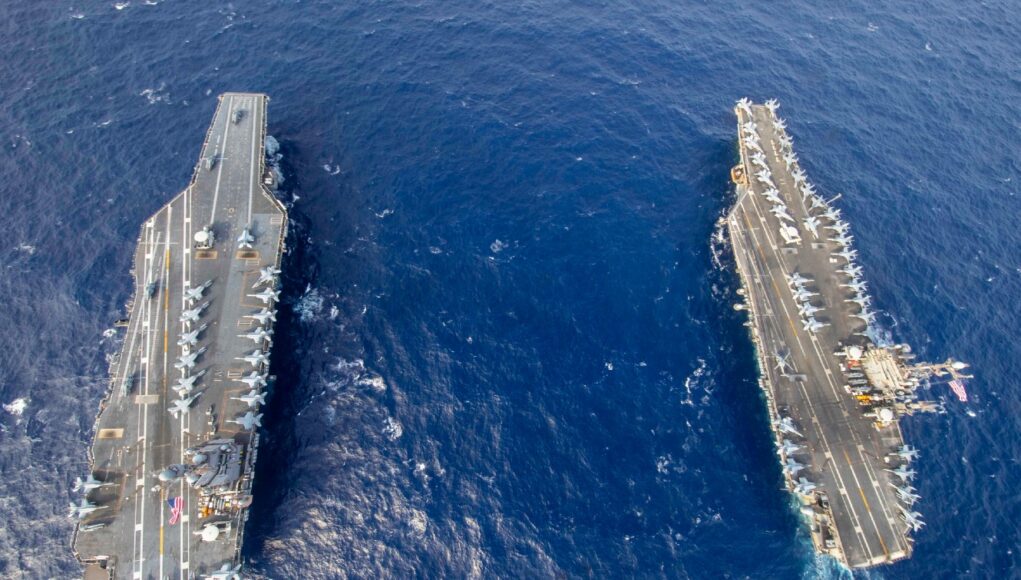
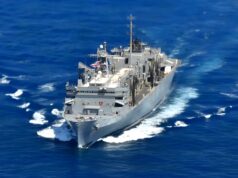
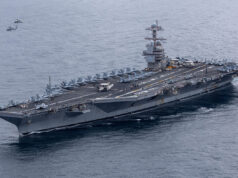
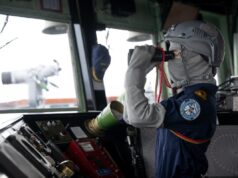



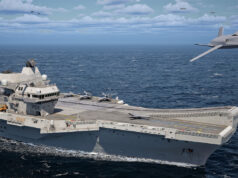

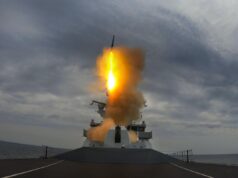


We need to face facts. European NATO can defeat Russia if it needed too in a defensive war. It would be brutal and costly but with a unified force of Danish, British, French, Italian, Dutch, German, Polish, Romanian, Bulgarian, Spanish, Portuguese, Turkish and Greek forces it could easily be done.
What EUROPEAN NATO lacks are key enablers such as Tanker aircraft, stealth bombers, growler electronic warfare and air suppression forces. Bridging equipment. Amphibious landing capacity, even more so now the RN has relinquished itself of that capability.
European NATO should look to regenerating these capabilities via a delegated capability role. So each country has a designated specialist capability and fulfills that role as part of our shared collective defence.
Cheap amunition would be wise, to avoid the 1 week to 3 month gap in firepower. Soldiers and complexe plateform have to get something to shoot at the ennemy all day long. Complex ammo is good, but numbers will never match the need. So a low mix would save far more lives than one could imagine…
If a European Saceur is appointed, then he not only will need troupes, many do allready exists. He will need them with stockpile of ammunitions.
The command structure lead by a European is just part of what we need…
Google pay 92 every hour my last check was 8400 working 10 hours per week on the web. My more youthful sibling companion has been averaging 18k throughout recent months and he works around 24 hours per week. I cannot accept how simple it was once I attempted it out.This is my main thing……….,.,.,.. WORKSTAR1.COM
Just my opinion, but in a scenario where the US isn’t involved, it’s a bit of a stretch to assume Europe would be unified in responding to a fully kinetic war with Russia, and a major stretch to assume Turkey would commit troops to the fight to defend the Baltics. In this scenario, I unfortunately believe it will be a coalition of the willing.
I just started 3 weeks ago this web income system that my friend recommended to me and I’ve gotten 2 checks for a total of $9,200…this is the best decision I made in a long time! This extra cash has changed my life in so many ways, thank you!”
HERE_____ 𝐖𝐖𝐖.𝐇𝐈𝐆𝐇𝐏𝐑𝐎𝐅𝐈𝐓𝟏.𝐂𝐎𝐌
The only reason Russia can attack Europe is fueling WW3 because much as the world feared Russia, it has embarrassed itself enough in Ukraine but wait, mad Vlad can go mad for real and you can never underestimate his insanity.
How much worse will it be if NATO is commanded by an American and the USA decides not to honour Article 5.
None of this is our choice, all we can do is adapt to US political machinations and make sure they do affect us.
I wouldn’t trust the Americans to honour article 5 unless there was something in it for them
Whilst Article 5 is clear that an attack on one is an attack on all, the reaction is the decision of each nation.
To date, a strongly worded post on “truth social” is the most that could be expected, so the case for SACEUR to be American is weak and not consistent with the American design and intent for control of NATO because they contribute most.
That point is unknown to the willfully ignorant support base of #47, busy proving that ignorance of history is how to repeat expensive mistakes.
Given that UK has CASD Nuclear deterrent assigned to NATO, USN will become the US independent Nuclear power at the whim of POTUS so persisting the complexity for aggressors. No change in practice.
Probably more importantly, Chairman xi has not authorised RF Nuclear weapons, so the killer of the crimlin has only empty threats.
I would make the comment that no european commander has had command over that amount of troops because the Americans wouldn’t allow it. As detailed in your piece the structure has always been such that the Americans have the final say. I honestly cannot concieve of a situation where the Americans would allow deployment of US troops under a European Sacuer.
They would either retake command or simply not comply with their treaty obligations.
Excellent article including the framing of some important issues, potentially occurring in the immediate future. Hope the same are being adequately addressed. 🤔🤞
Considering that russian superiority since the Iron Curtain came down is now a myth discovered by the Ukrainians, I say that we have nothing to worry about!
Europe would need to reorganise and start filling in the gaps.
The core of European Nato pillar is going to be the UK and France deterence force. For the time being, a British officer may be appointed. It would be the most promissing solution, given long lasting UK presence with Nordic states. France presence in the Baltics and southern Europe is more recent, so common feeling of belonging and security is may be not as strong. After the sign off of bilateral agreement (France, Poland and probably more), I guess it would be wise to integrate UK, German, Polish and Benelux forces in the French Poker exercise, as agressor force. This would convey the right signal. Today, these forces add complexity, and if agreed, deepth, in the exercise. Tomorrow, these airforces would join side to open the road and unleash last warning if need be. This would be absolutely appropriate. This way we would avoid any power vacuum or credibility gap in eNato.
Trump is just doing what he’s been told.
we should anticipate the gaps and fill them in BEFORE the doo doo hits tfani want us to move away from the expeditionary dogma in building our aims for the British forces. I want forces where th mindset is to fight and not think as much about getting somewhere soon enough.
British commanders commanded multi national divisions in both Iraq and Afghanistan after 2003. RC South had US forces under command of a British general.
So to be fair, No British General has commanded an operational division since 2014… I’d be interested to see if a US General has.
Everybody can earn 250$+ daily… You can earn from 10000-15000 a month or even more if you work as a full time job…It’s easy, just follow instructions on this page, read it carefully from start to finish… It’s a flexible job but a good earning opportunity..
go to this site home tab for more detail thank you…… 𝐖𝐖𝐖.𝐍𝐄𝐓𝐏𝐀𝐘𝟏.𝐂𝐎𝐌
the arrogance of America towards anyone else is something that weak little Europe are expected to just trot along nicely behind them. and follow the American drumbeat. for me, it sucks projects in Europe should be kept within a European remit sideline the Americans as much as possible could make them have to change the way they look at us. I’m for a com bined European military setup. that would provide aircraft numbers for the UK to retake control of the u.s airbases in Norfolk.
Nato carries on with or without the Americans. Trump is an unpredictable loon happier supporting Putin than those who Putin threatens. He is not speaking nor acting like an ally. We are a deterrent to Russia but are far wekaer than we ere ten years ago after treacherous cuts way beyond anything that should ever have been allowed. Best we ramp up rearming while hoping the USA come to its senses rather than sliding into Facism under the MAGA madhouse.
In the face of Trumps insane bullying & gaslighting we shouuld be sternly refusing rather than blowing smoke up his backside hoping sanity would arrive where it’s never dwelt.
Like it or not European NATO needs to take on comand & control oversight whenever needed.
No USA ,,,,No NATO ??
probably no Canada , doubtful no , UK .
reduction in defence spending from certain EU countries..
brand new EU defence force,
run and controlled by U know who ??
and the UK will be worn down to pay for most of it.
on the other hand, I could be totally wrong,
feel free, happy Easter…
Well you know what they say, hope for the best, plan for the worst. I suggest we plan for the United States being at best an unreliable ally. Maybe even leaving NATO, altogether. Significant uncertainty has already been injected into the American commitment to NATO by the United States president.
I have complete faith that the Euro-Nations in NATO can easily work with the USA on any of these issues, if it comes that the next SACURE is not from the USA. I’d be shocked if there weren’t already discussions, or plans, already in motion ready to be acted upon should the time arise.
America has a fixation for the leading position of all major world institutions being an American and like poodles the world accepts it. in short, it could be said that America rules the world. all European initiatives should be recommitted to farthing it’s own agendas without interference or pressure from America.i don’t like the yanks and I don’t trust them either.
One of the core issues is the US set up NATO to be controlled by the US, it’s essentially always been an unequal partnership, but the US set and enforced the terms they are now objecting to.
I think the writer of the article, was very clear in the issue of not having a US commander of NATO but these are structural issues in NATO set in place by the U.S.
So I don’t think the core question is “why it matters if an American no longer commands NATO” the question should actually be “ how does Europe make it irrelevant if an American does not command NATO”.
The big issue is that the US have created the structures that made it impossible for NATO to function without US leadership, but no longer wish to lead NATO.…and even if it changed its mind and wanted to keep leading, the other NATO countries have lost all faith and trust in the US as a stable leader…that is the existential question for NATO.. not discussions of percentages of who pays what.
I’m honestly not sure NATO can get over that existential question as US leadership is hardwired into the very fabric of the NATO treaty..in case of fact NATO cannot function without US leadership as a number of the articles specify require it. I think the European NATOs know this and therefore NATO is now simply a placeholder until a new treaty organisation can be created.
A NATO request for a US nuclear strike would require the authorisation of the President, regardless of what channel it came through or what SACEUR’s nationality was. Whether that authorisation would actually be forthcoming has been open to debate for decades, so this particular point strikes me as a non-issue.
British security assurances have been flouted, a British citizen murdered, a policeman seriously injured on British soil, and this country is still not prepared to front up. If reconstructing a credible conventional deterrent looks expensive today, war, only possibly conventional, will be a great deal more expensive in blood and treasure tomorrow when Russia subverts Moldova and then seizes the Suwalki corridor…..and they already told us that is going to happen.
NATO was set up so that the US could “control” Europe militarily and, to an extent, politically; however, the US had Article 5 worded in such a way that even if a NATO member was attacked, it need not require a US military response.
Article 5 is worded and designed to be ambiguous; it does not mean that everyone jumps into military action.